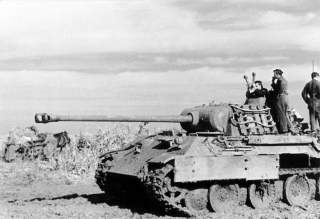Exposed: The Secret Ex-Nazi Army That Guarded West Germany
After losing millions of men to defeat Hitler, the Western Allies might have had to deal with an army of German war veterans backed by former Nazi senior officers who were rising stars in the West German military.
If the Soviets had invaded West Germany in the early days of the Cold War, they would have found more than a hodgepodge of NATO troops waiting for them.
They would also have confronted a secret army of Hitler’s former soldiers, waiting to settle scores with the Communists. Considering the brutal, take-no-prisoners warfare on the Eastern Front in World War II, former German SS troopers fighting vengeful Red Army troops—again—would have been the height of savagery.
The German magazine Der Spiegel discovered a file buried for years in the archives of the BND, Germany’s spy agency. The documents reveal that in 1949, some 2,000 former officers of the SS and the Wehrmacht—the regular German military under the Third Reich—formed a secret paramilitary army that might have numbered as many as 40,000 fighters in the event of war.
The Allied occupation forces didn’t know about it. If they did, they would have discovered the involvement of several former Nazi generals who would later become senior commanders in the Bundeswehr, West Germany’s army.
The underground army was apparently supported by former Third Reich generals such as Hans Speidel, who became chief of NATO ground forces in Central Europe in 1957, and Adolf Heusinger, the first inspector general of the Bundeswehr.
Thus after losing millions of men to defeat Hitler, the Western Allies might have had to deal with an army of German war veterans backed by former Nazi senior officers who were rising stars in the West German military. Anti-communist or not, the existence of such an organization surely wouldn’t have reassured the survivors of Coventry and Oradour-Sur-Glane.
The secret army was the brainchild of Albert Schnez, a former Wehrmacht colonel who later became an official in the Bundeswehr. Along with other German war veterans just after the war, he worried what would happen if the Soviets invaded. West Germany had no army until 1955, and America demobilized much its own military in 1945, leaving Western Europe vulnerable to Soviet conquest.
Schnez wanted ready-made battle staffs, composed of combat-experienced officers, who would form the nucleus of combat divisions. He was convinced that if the Soviets attacked, legions of German war veterans—and there were no shortage of those after World War II—would have flocked to the colors.
They planned to wage war against the Soviets as guerrillas, perhaps operating from Spain or Switzerland.
The West German parliament also didn’t know about this secret army, but the German security service had its leader on its payroll. In 1951, Schnez approached the Gehlen Organization, as German intelligence was known at the time, to offer the services of his organization.
The timing was impeccable. The Korean War was raging, and U.S. and European leaders worried that the conflict was a Soviet diversion to draw off U.S. forces while the Soviets invaded Western Europe.
In a disturbing reminder of where the members of the secret army learned their trade, they spied on leftist West German politicians. Had West Germany gone to war with the Soviets, one wonders what would have happened to anybody the secret army deemed insufficiently anti-communist.
But how would this army have fared against a Soviet invasion?
Probably not well. The massive Soviet tank armies sweeping west to the Ruhr—or the English Channel—might just possibly have been contained by threadbare NATO forces, or more likely the threat of American nukes.
Tens of thousands of aging, poorly armed SS veterans might have been a nuisance to Soviet supply lines, but no more. Considering Soviet memories of German atrocities, one suspects that an insurgency led by ex-Nazis would have been dealt with swiftly and mercilessly.
It’s also remembering that Hitler had the same idea. With Allied and Soviet armies remorselessly closing in on Germany from west and east in 1944 and ’45, Hitler had an inspiration. The German people would rise up as guerrillas against the occupiers as they advanced into German territory.
The “Werewolves” were supposed to strike terror in the hearts of Germany’s enemies. Indeed, the Allies feared a Nazi guerrilla war. Instead, the Werewolves merely proved that after six years of war, the German people were tired, hungry and bombed out.
They just wanted the war to end, even in defeat.
Perhaps the secret army would have discovered that the German people preferred being Red to being dead.
This first appeared in WarIsBoring here.

